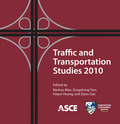Multistage Linear Prediction Model of Track Quality Index
Publication: Traffic and Transportation Studies 2010
Abstract
Both Chinese and foreign researchers have developed linear models to predict track irregularities. These models adopt the Track Quality Index (TQI) as an index to evaluate overall track irregularity. In these models, an averaging method is employed to calculate the slope k of track irregularity over a particular track section and k is then used to predict future TQIs. However, complicated factors affect track irregularity. Roadbed state, passing tonnage, train running speed and track structure are all important factors that determine track irregularity changes. Under the joint action of various factors, changes in track irregularity are characterized by nonlinearity, which can be described the so-called Bathtub Curve. Linear prediction models provide a simple but convenient tool to predict the evolution of track irregularities. In a certain sense, these models help to deepen research and can shed new light on the pattern of track irregularity changes. However, these models inevitably have two obvious disadvantages. The first is that no systematic consideration is given to the inherent characteristics of track irregularity changes, while the second is that it is apparently impractical to use a single slope k to predict track irregularities for all track sections of a whole railway line. The result is that when linear models are used to predict track irregularity changes, big predictive errors are caused. In the light of the cyclic, exponential and multistage changes in track irregularity, the current authors have developed a multistage linear prediction model for track irregularity. Given the cyclic nature of track irregularity changes, we take a 200 m track section as the unit section for our research. Because track irregularities change at different rates within one track irregularity development cycle, we divide such changes into several shorter stages. Based on our understanding of the three major characteristics of track irregularity changes, we put forward an improved linear prediction model, namely the multistage linear prediction model (MLPM). The model adjusts the calculation method of k to make the predicted results fit better with the actually measured values. The authors finally use track car inspection data from the Beijing-Shanghai Railway Line (Jing-Hu Line) to validate the model and compare the predicted results with the measured data.
Get full access to this article
View all available purchase options and get full access to this chapter.
Information & Authors
Information
Published In
Copyright
© 2010 American Society of Civil Engineers.
History
Published online: Apr 26, 2012
ASCE Technical Topics:
- Curvature
- Engineering fundamentals
- Errors (statistics)
- Geomechanics
- Geometry
- Geotechnical engineering
- Highway and road management
- Highway transportation
- Highways and roads
- Infrastructure
- Joints
- Mathematics
- Rail transportation
- Railroad tracks
- Railroad trains
- Slopes
- Statistics
- Structural engineering
- Structural members
- Structural systems
- Transportation engineering
Authors
Metrics & Citations
Metrics
Citations
Download citation
If you have the appropriate software installed, you can download article citation data to the citation manager of your choice. Simply select your manager software from the list below and click Download.
